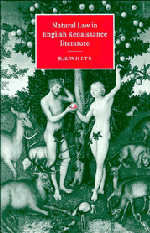Book contents
- Frontmatter
- Contents
- Preface
- Acknowledgments
- 1 Natural Law in history and Renaissance literature
- 2 The heritage of classical Natural Law
- 3 The reception of Natural Law in Renaissance England
- 4 Law and literature in sixteenth-century England
- 5 More's Utopia
- 6 ‘Love is the fulfilling of the law’: Arcadia and Love's Labour's Lost
- 7 ‘Hot temper leaps o'er a cold decree’: The Merchant of Venice and Measure for Measure
- 8 Shakespeare's The History of King Lear
- 9 Milton and Natural Law
- Epilogue: Hobbes and the Demise of classical Natural Law
- Appendix: Aquinas on the right to own private property
- Notes
- Select bibliography
- Index
2 - The heritage of classical Natural Law
Published online by Cambridge University Press: 17 September 2009
- Frontmatter
- Contents
- Preface
- Acknowledgments
- 1 Natural Law in history and Renaissance literature
- 2 The heritage of classical Natural Law
- 3 The reception of Natural Law in Renaissance England
- 4 Law and literature in sixteenth-century England
- 5 More's Utopia
- 6 ‘Love is the fulfilling of the law’: Arcadia and Love's Labour's Lost
- 7 ‘Hot temper leaps o'er a cold decree’: The Merchant of Venice and Measure for Measure
- 8 Shakespeare's The History of King Lear
- 9 Milton and Natural Law
- Epilogue: Hobbes and the Demise of classical Natural Law
- Appendix: Aquinas on the right to own private property
- Notes
- Select bibliography
- Index
Summary
One way to grasp something of the essence of Natural Law is to consider its history. Like most leading ideas in western thought, the first systematic presentation of Natural Law can be traced back to Plato and his star student, Aristotle. The latter is the more significant in this tradition, but it was Plato in The Republic who posited a moral order which embodies eternal laws, existing beyond the temporal world but binding upon this world.
However, the story begins even before these two thinkers, since they themselves drew, often in a spirit of opposition, from the work of the first and probably most remarkable group of philosophers, Heraclitus and the Sophists. Now known as the pre-Socratics, these men date back to 585 BC – a curiously precise and therefore nominal date handed down by tradition – and they built upon each others' ideas up until Plato's time. None of their own writings exist, and their ideas are known entirely through fragmentary quotations and descriptions by later figures. In many ways they can be seen as the most original thinkers in the entire western philosophy, and a link with the eastern. Heraclitus, known as ‘the Obscure’, was the most seminal of them all, and it is no exaggeration to say that he initiated many of the fundamental questions which have preoccupied Western philosophy down through the centuries.
- Type
- Chapter
- Information
- Natural Law in English Renaissance Literature , pp. 21 - 43Publisher: Cambridge University PressPrint publication year: 1996



